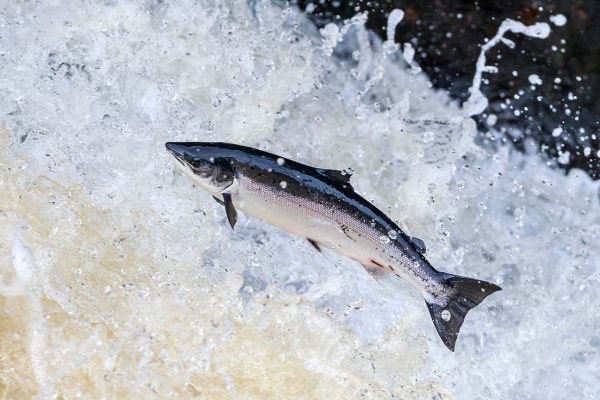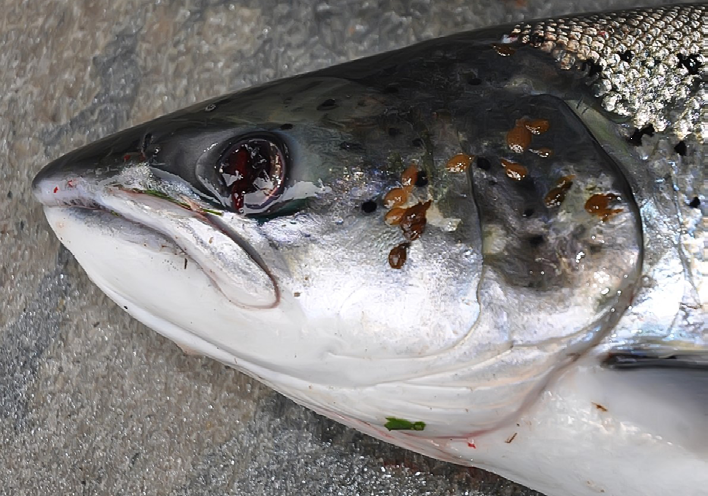-
COP 26 – Salmon School
Salmon and COP26 Wild salmon are a majestic symbol and indicator of the health of our rivers, land, and oceans. They range across nearly half the planet. But climate change and other human impacts are driving them towards extinction. Investing in community-driven approaches to save wild salmon will help us limit global warming to 1.5°C and help communities adapt to near-term climate change. Salmon School embodies the local work on river systems worldwide to restore salmon and the cold, clean water they need—from the River Clyde in Glasgow to the outermost reaches of the Arctic. Here is how safeguarding salmon can help achieve the four goals outlined in the 2021 United Nations Climate Change Summit (COP26). The following initiative at COP 26 SEEKS TO HIGHLIGHT THE PLIGHT OF WILD SALMON IN A CHANGING CLIMATE. Take the time to get involved. There is little doubt that climatic change has and will substantially change wild salmon survival here in Ireland. The Salmon School
Continue reading -
Shot Head – Bantry Bay
Salmon Watch Ireland is extremely disappointed with the decision of the Aquaculture Licensing Appeal Board decision to grant an aquaculture licence to MOWI for a new salmon farm at Shot Head in Bantry Bay. Our initial evaluation of the Board's decision points to a lack of knowledge and indeed understanding of the European Court of Justice standard of the ‘best available scientific knowledge in the field ” regarding the impact of sea lice on wild salmonid populations. The decision is counter to the recent and very welcome intervention of the EU delegation at the recent North Atlantic Salmon Conservation Organisation conference in June 2021 which stated that: Parties/ Jurisdictions should consider adopting a policy of phasing out open net pen salmon aquaculture over a specified period or licence term and restrict any new licences to those utilising alternative technologies in order to make significant progress towards achievement of the International Goals for sea lice and containment. This policy should be prioritised in sensitive areas such as the estuaries of Class I salmon rivers or salmon rivers in Special Areas of Conservation. The reliance of the industry and ALAB on scientific material provided by the Marine Institute which has consistently downplayed the impact of sea lice from salmon farms on wild salmonids is alarming. The Marine Institute as part of the Irish delegation to NASCO and thus part of the EU delegation must now explain why the institute is lending support to the open net salmon farming industry in Ireland while being supportive of EU policy to NASCO regarding the phasing out of open net salmon farming in order to protect wild salmonids from sea lice and escapees. Salmon Watch Ireland will examine in detail the determination by ALAB before deciding our next course of action.
Continue reading -
Seaspiracy
This film is available on Netflix. It is well worth watching and demonstrates the appalling situation regarding fish farming and the unsustainable way we treat our oceans. Film is fully available on Netflix. Seaspiracy https://www.youtube.com/watch?v=1Q5CXN7soQg
Continue reading -
The Status of Irish Salmon Stocks in 2020 with Catch Advice for 2021
Salmon Watch Ireland would like draw your attention to the recently published document from the Technical Expert Group on Salmon. We will answer any questions that you may have or request clarification from TEGOS on aspects that you are concerned with. The links to the reports are listed here: Catch Advice 2021 River Specific Advice The Technical Expert Group on Salmon (TEGOS) advises that in 2021: 48 rivers have an advised harvestable surplus as they are exceeding their conservation limits (CLs). A further 32 rivers, may be opened on a catch and release only basis, subject to IFI management criteria based on having a high probability of achieving 50% of their conservation limit (CL) or exceeding the management qualifying fry threshold of ≥15 fry (0+) per 5 minute electrofishing (multiple site catchment average). In addition 64 rivers are (a) failing to meet 50% of their CL or (b) recent data to determine their CL attainment status are lacking. Where there is a lack of data, or where catchment-wide electro-fishing surveys indicate juvenile abundance below the fry threshold, the TEGOS assumes that these rivers are failing to meet CL. There are 16 rivers for which there are significant fisheries on the MSW (spring salmon) component of the stock and a separate assessment is made. Of these: 11 have an advised harvestable surplus as they are exceeding their CL. 5 rivers may be opened on a catch and release-only basis subject to IFI management criteria as they have a high probability of achieving 50% of their CL or exceed the minimum mean fry threshold (≥15 fry) in catchment-wide electro-fishing. There are currently 40 rivers or river tributaries of the 144 salmon rivers assessed in Special Areas of Conservation (SACs) where salmon have a qualifying interest under the EU Habitats Directive. Of these, only 20 are above their CL.
Continue reading -
Roadmap Policy – Inland Fisheries Ireland
A Roadmap Policy Framework has been launched for Ireland’s Inland Fisheries Wednesday, 27th of January 2021: The Board of Inland Fisheries Ireland (IFI) welcomes Minister Eamon Ryan’s publication of ‘Towards a Policy Framework for Inland Fisheries in Ireland - A Roadmap’. The roadmap forms an important part of the first stage of developing a policy and regulatory framework for the inland fisheries sector. Francis O’Donnell, CEO of Inland Fisheries Ireland said: ‘We encourage all of our stakeholders to get involved in the process of developing this framework for the future of Ireland’s inland fisheries resource. The roadmap is a significant first step in paving the way forward towards a resource that will be conserved and managed in a sustainable way.’ To read more about the roadmap and how to be involved in the process please visit: https://www.gov.ie/en/publication/17099-towards-a-policy-framework-for-inland-fisheries-in-ireland-a-roadmap/.
Continue reading -
Salmon Watch Ireland – Consultation on Policy Document
More and Stronger smolts ‘The rational management approach is to redouble efforts to address factors impacting on productivity to ensure that …. salmon rivers…. produce the maximum number of healthy wild salmon smolts’ Background – Salmon stocks are close to crisis point Before reading our Policy Document it might be advisable to review the present state of Atlantic salmon in Ireland. In conjunction with the following paragraphs and the short film you will be able to appreciate the many factors affecting Atlantic salmon and sea trout stocks in Ireland. We would appreciate your views on the Policy document and any ideas you may have to help progress conservation of these iconic fish. It is not an exaggeration to suggest that, in the lifetime of people living today, Ireland’s wild Atlantic salmon could become a curiosity confined, at best, to a small number of rivers. The species may not become totally extinct (although it could) but there may not be sufficient stock for either commercial or recreational exploitation. A species that has huge Irish heritage and folklore significance and which, in the past, has had major social, economic and recreational value could to all intents and purposes be lost. There is an obligation on all of use to do our utmost to prevent that happening in the interests of our own and of future generations. It will not be an easy task. Read More
Continue reading -
Sea Lice Ireland – Erriff River Study
The long term study of sea lice in Ireland by Inland Fisheries Ireland has definitively linked a reduction of up to 50% in returning adult salmon to high levels…
Continue reading -
Marine Harvest – Smolts or Not
Smolt overstocking by Marine Harvest Hereunder find documentation regarding the gross over…
Continue reading -
Scottish Salmon Farming and its Environmental Impacts
This review is a very important element in understanding the impacts of salmon farming in Scotland and is certainly important in the ongoing debate surrounding aquaculture in Ireland. It…
Continue reading
- 1
- 2











